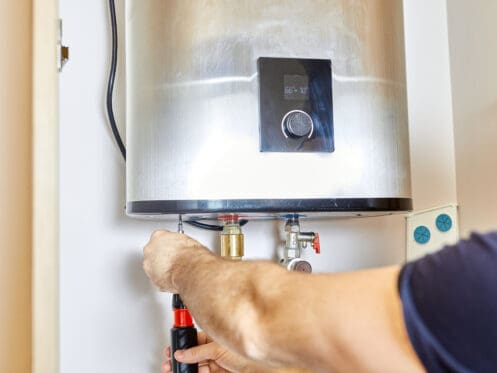When homeowners think about the safety of their homes, rarely does the water heater get the top consideration. This large appliance presents many risks if neglected for long enough. Some things you can do to assure the safety of your home are to have it inspected, secure it to the wall, and make sure there is a clear path to it for service and inspection. Our team at First Choice Plumbing, Heating & Air Conditioning is always happy to answer any questions you may have about your specific water heater and safety, so we’ve compiled a list of tips to get you started.
Have a Temperature and Pressure Relief Valve Installed
A temperature and pressure relief valve helps prevent your home’s water heater from becoming a serious hazard due to over-pressurization. This device helps relieve excess pressure when it’s at dangerous levels. It would help if you also had your TPR valve tested annually. If it’s corroded and fails to operate, it needs replacing right away. Neglecting this valve may cause hazards to your home or household, so it’s essential to keep it in good working condition to avoid issues.
Be Careful With Flammable Materials
A water heater, especially a gas water heater, needs to be in an uncluttered area and away from flammable materials. You should keep all items with flammable vapors, such as gasoline, paint, solvents, and cleaning products away from your home’s water heater. All these items may ignite upon coming into contact with heating elements or a pilot flame and can cause a hazard like a fire. Keep at least 3 feet of clearance around your home’s water heater and ensure that nothing is on or around it. This also makes it easier to get to a fire if there is one.
Have Your Gas Water Heater Checked for Gas Leaks
A gas leak around your home’s water heater is a potential health and safety hazard. It’s vital to have the connections inspected regularly. If you smell a rotten egg odor around the water heater, that’s the smell of gas, and you should leave the home and call for emergency services promptly. When your home is secure, our team can come to repair any leak you may have in a gas line or around the connection.
Check the Unit for Corrosion Regularly
If a water heater doesn’t have regular maintenance, the neglect may signal more corrosion than normal. The result may be that the tank isn’t stable any longer. Our team can check your water heater tank for rust around the bottom and at the seams and fittings. Even small amounts of rust signify an unsafe amount of internal decomposition, compromising the structure of the tank, which may lead to leaks or the bursting of the tank.
Keep an Eye on the Temperature Setting
Have your water heater’s thermostat set to 120°F (49°C) to balance safety and efficiency. If the temperature is too high, some of the dangers are scalding someone, a shortened lifespan of the unit, or possibly damaging the water heater element through overheating. Lowering the temperature reduces energy consumption, helps to prevent scalding, and extends the life of the water heater.
Install a Carbon Monoxide Detector
If you have a gas water heater, install a carbon monoxide detector in that same area. Carbon monoxide is a colorless, odorless gas that may result in fatalities when inhaled. Poor ventilation or malfunctioning in a water heater may give rise to CO. An appropriately installed CO detector signals when it detects dangerous levels of gas so that you can take immediate measures. Put a detector near your water heater and in every room where people sleep. Test the detectors frequently and change batteries often so that you have peace of mind that they work properly.
Secure the Water Heater
It’s necessary to secure your home’s water heater to keep it from falling over, tipping over, releasing gas, causing water leaks, or igniting fires. Doing this consists of having metal straps installed, which circle the tank and fasten to the wall studs. Securing the water heater protects the unit and keeps it from being a danger to your household.
Provide Proper Ventilation
It’s necessary to have proper ventilation if your home’s water heater operates with gas. They need proper ventilation to avoid harmful situations like a buildup of carbon monoxide. Make sure to have us inspect all of the vent pipes and keep them free from any obstructions and damage. If there are any defects, improper connections, blockages, or rust, our team will find them and help rectify the situation right away so that we can assure you that you have a home with proper ventilation for your gas water heater.
Have the Tank Drained Regularly
Sediment can create overheating or loss of efficiency and possibly damage the unit. Draining it once a year clears out the sediment accumulation in the water heater tank and helps keep it in good working condition. When we drain the water heater, we shut off the water heater and attach a hose to the drain valve before flushing the tank until the water is clear. This is a preventative measure to extend the life of your water heater and prevent problems such as uneven heating or strange noises that may occur.
Have the Pipes and Water Heater Insulated
Insulating the pipes and the water heater enhances safety and helps decrease energy used. Proper insulation is also safer because it minimizes the chances of contact burns that occur as a result of touching hot pipes, especially in houses with children. Insulating the heater allows it to use less energy when heating water. This also minimizes strain on the system.
Turn Off the Water Heater When Leaving for Vacations
Have the water heater shut off before leaving on a long vacation to avoid accidents or wasting energy while away. We can shut off the circuit for electric heaters or the gas supply for water heaters that run on gas. This precaution helps to prevent all potential problems, such as leaks, bursts, or a mishap that could occur if the water heater remains unattended for a long period. The second advantage of shutting off the water heater is to reduce energy consumption as it keeps cycling to help the water remain hot.
Find Out the Age of Your Water Heater
How old is your water heater? Knowing this will help you know whether your water heater is safe and help you plan a maintenance schedule. Normally, water heaters last for 10 to 15 years if electric and eight to 12 years if gas. Once your water heater reaches this age, it could start leaking, become less efficient, and be prone to failure. You can verify age through the manufacturer’s label or the serial number on the unit. If your water heater is nearing or over that estimated age, we can come out, check it, and offer a replacement with a new unit if necessary.
At First Choice Plumbing, Heating & Air Conditioning in Metuchen, NJ, we provide water treatment, plumbing repair, and fixture repair services for homes in the area. Our friendly team also provides cooling, heating, and indoor air quality services. Contact First Choice Plumbing, Heating & Air Conditioning for more information today!



